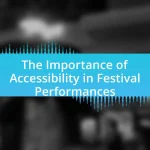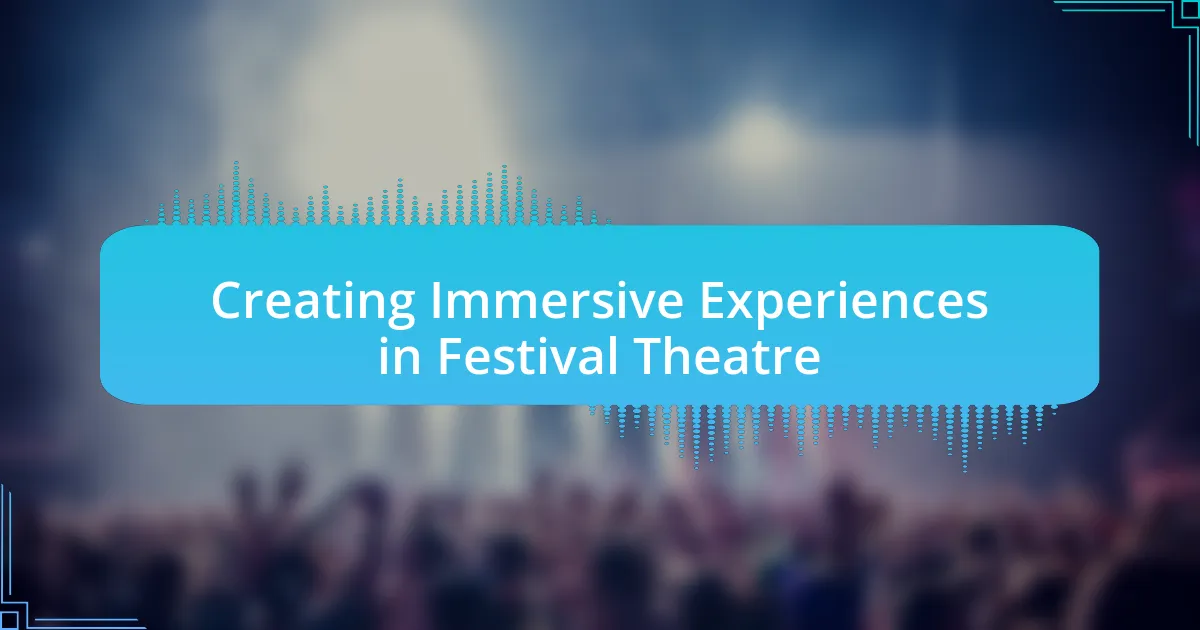Loyalty programs for festival theatre audiences are structured initiatives aimed at rewarding frequent attendees with benefits that enhance their experience and encourage repeat visits. These programs typically include incentives such as discounts on tickets, exclusive access to events, and personalized rewards, which significantly boost audience engagement and retention. Research indicates that effective loyalty programs can increase attendance by up to 30% and contribute to higher ticket sales and customer satisfaction. The article explores key features of successful loyalty programs, strategies for implementation, the role of data analytics, and future trends, providing a comprehensive overview of how these initiatives can foster a dedicated audience base for festival theatres.

What are Loyalty Programs for Festival Theatre Audiences?
Loyalty programs for festival theatre audiences are structured initiatives designed to reward frequent attendees with benefits that enhance their experience and encourage repeat visits. These programs typically offer incentives such as discounts on tickets, exclusive access to events, and special promotions tailored to audience preferences. For instance, a study by the National Endowment for the Arts found that loyalty programs can increase attendance by up to 20% among regular patrons, demonstrating their effectiveness in fostering a dedicated audience base.
How do loyalty programs enhance audience engagement in festival theatres?
Loyalty programs enhance audience engagement in festival theatres by incentivizing repeat attendance and fostering a sense of community among patrons. These programs often offer rewards such as discounts, exclusive access to events, or special seating, which encourage individuals to return for future performances. For instance, a study by the National Endowment for the Arts found that patrons who participated in loyalty programs attended 30% more events than those who did not. This increased frequency of attendance not only boosts ticket sales but also strengthens the emotional connection between the audience and the theatre, leading to higher levels of engagement and advocacy for the venue.
What are the key features of effective loyalty programs in this context?
Effective loyalty programs for festival theatre audiences include personalized rewards, tiered membership levels, and exclusive access to events. Personalized rewards enhance customer engagement by tailoring benefits to individual preferences, which can increase attendance and spending. Tiered membership levels incentivize repeat visits by offering escalating benefits, encouraging patrons to attend more frequently to unlock higher rewards. Exclusive access to events, such as pre-sale tickets or backstage experiences, creates a sense of belonging and enhances the overall experience, fostering deeper connections with the theatre. These features collectively drive customer retention and satisfaction, as evidenced by studies showing that personalized experiences can increase customer loyalty by up to 60%.
How do loyalty programs influence ticket sales and attendance?
Loyalty programs significantly enhance ticket sales and attendance by incentivizing repeat purchases and fostering customer retention. These programs often offer rewards such as discounts, exclusive access, or points redeemable for future tickets, which motivate customers to choose a specific venue or event over competitors. For instance, a study by the Harvard Business Review found that loyal customers are 5 times more likely to purchase again and spend 67% more than new customers. This demonstrates that loyalty programs not only increase immediate ticket sales but also build a long-term audience base, ultimately leading to higher overall attendance at events.
Why are loyalty programs important for festival theatres?
Loyalty programs are important for festival theatres because they enhance audience engagement and retention. By offering rewards and incentives, these programs encourage repeat attendance, which is crucial for the financial sustainability of theatres. Research indicates that loyal customers are more likely to attend multiple events, leading to increased ticket sales and revenue. For instance, a study by the National Endowment for the Arts found that regular attendees contribute significantly more to the arts than occasional visitors, highlighting the economic impact of fostering loyalty.
What benefits do loyalty programs provide to theatre organizations?
Loyalty programs provide theatre organizations with increased customer retention and enhanced audience engagement. By incentivizing repeat attendance through rewards, theatres can foster a loyal customer base, which is crucial for financial stability. Research indicates that loyal customers are more likely to attend multiple performances and recommend the theatre to others, leading to higher ticket sales and increased word-of-mouth marketing. For instance, a study by the National Endowment for the Arts found that repeat attendees contribute significantly to overall revenue, highlighting the financial benefits of loyalty initiatives.
How do loyalty programs impact audience retention and satisfaction?
Loyalty programs significantly enhance audience retention and satisfaction by incentivizing repeat engagement and fostering a sense of belonging. These programs often provide rewards, exclusive access, and personalized experiences, which encourage patrons to return and participate more frequently. Research indicates that businesses with loyalty programs can see retention rates increase by 5% to 10%, leading to a substantial boost in profitability, as acquiring new customers is typically more costly than retaining existing ones. Additionally, a study by the Harvard Business Review found that loyal customers are likely to spend 67% more than new customers, underscoring the financial benefits of such programs. Thus, loyalty programs effectively create a cycle of satisfaction and retention among festival theatre audiences.

What strategies can be employed to build effective loyalty programs?
To build effective loyalty programs for festival theatre audiences, organizations should implement personalized rewards, tiered membership levels, and engaging communication strategies. Personalized rewards enhance customer experience by tailoring benefits to individual preferences, which can increase engagement and retention. For example, offering discounts on favorite shows or exclusive access to behind-the-scenes events can create a deeper connection with the audience.
Tiered membership levels incentivize increased spending and participation by providing escalating benefits, such as priority seating or exclusive merchandise, which encourages loyalty over time. Engaging communication strategies, including regular updates and personalized messages, keep audiences informed and connected, fostering a sense of community.
Research indicates that personalized marketing can increase customer engagement by up to 20%, demonstrating the effectiveness of these strategies in enhancing loyalty programs.
How can data analytics improve loyalty program design?
Data analytics can significantly enhance loyalty program design by enabling organizations to understand customer behavior and preferences more accurately. By analyzing data from customer interactions, organizations can identify trends, segment audiences, and tailor rewards to meet specific needs. For instance, a study by McKinsey & Company found that companies leveraging customer data effectively can increase their marketing ROI by 15-20%. This data-driven approach allows for personalized experiences, which can lead to higher engagement and retention rates among festival theatre audiences.
What types of data should be collected to inform loyalty program strategies?
To inform loyalty program strategies, organizations should collect customer demographic data, purchase history, engagement metrics, and feedback data. Customer demographic data, such as age, gender, and location, helps identify target audiences and tailor offerings. Purchase history reveals spending patterns and preferences, enabling personalized marketing. Engagement metrics, including attendance frequency and interaction with promotional materials, provide insights into customer loyalty and program effectiveness. Feedback data, gathered through surveys or reviews, highlights customer satisfaction and areas for improvement. Collectively, these data types enable organizations to design effective loyalty programs that resonate with their audience and drive retention.
How can audience preferences shape loyalty program offerings?
Audience preferences can significantly shape loyalty program offerings by guiding the types of rewards and engagement strategies that resonate most with them. For instance, if a festival theatre audience shows a strong preference for exclusive access to behind-the-scenes content or meet-and-greet opportunities with performers, loyalty programs can be tailored to include these experiences as rewards. Research indicates that 70% of consumers are more likely to recommend a brand with a good loyalty program, highlighting the importance of aligning offerings with audience desires. By analyzing ticket purchase patterns and feedback, theatre organizations can create personalized incentives that enhance customer satisfaction and retention, ultimately fostering a deeper connection between the audience and the theatre.
What are the best practices for implementing loyalty programs?
The best practices for implementing loyalty programs include creating a clear value proposition, personalizing rewards, and ensuring ease of use. A clear value proposition attracts customers by clearly communicating the benefits of joining the loyalty program, such as exclusive discounts or early access to tickets. Personalizing rewards based on customer preferences enhances engagement; for instance, offering tailored experiences or rewards that resonate with individual audience members can increase participation. Ensuring ease of use, such as a straightforward sign-up process and user-friendly interfaces, encourages more customers to join and actively participate in the program. According to a study by Bond Brand Loyalty, 79% of consumers are more likely to engage with brands that offer personalized experiences, highlighting the importance of personalization in loyalty programs.
How can theatres effectively communicate loyalty program benefits to audiences?
Theatres can effectively communicate loyalty program benefits to audiences by utilizing multiple channels such as email newsletters, social media, and in-theatre signage. These channels allow theatres to reach audiences directly and consistently, ensuring that information about exclusive offers, discounts, and rewards is easily accessible. For instance, a study by the American Theatre Wing found that targeted email campaigns can increase engagement rates by up to 50%, demonstrating the effectiveness of direct communication. Additionally, clear and visually appealing signage in the theatre can capture the attention of attendees, reinforcing the benefits during their visit.
What role does technology play in managing loyalty programs?
Technology plays a crucial role in managing loyalty programs by enabling efficient data collection, analysis, and personalized customer engagement. Through advanced analytics, organizations can track customer behavior and preferences, allowing for tailored rewards and targeted marketing strategies. For instance, a study by Accenture found that 83% of consumers are willing to share their data for personalized experiences, highlighting the importance of technology in fostering customer loyalty. Additionally, mobile applications and digital platforms facilitate seamless interactions, making it easier for customers to access rewards and engage with the program, ultimately enhancing customer satisfaction and retention.

What challenges might theatres face when building loyalty programs?
Theatres may face several challenges when building loyalty programs, including understanding audience preferences, managing costs, and ensuring effective communication. Audience preferences can vary widely, making it difficult for theatres to create a program that appeals to a diverse demographic. Additionally, the costs associated with implementing and maintaining a loyalty program can be significant, potentially outweighing the benefits if not managed properly. Effective communication is also crucial; theatres must ensure that potential members are aware of the program and its benefits, which can be challenging in a competitive entertainment landscape. These factors can hinder the successful establishment and sustainability of loyalty programs in theatres.
How can theatres overcome common obstacles in loyalty program implementation?
Theatres can overcome common obstacles in loyalty program implementation by adopting a customer-centric approach that prioritizes audience engagement and feedback. By actively involving patrons in the design and refinement of loyalty programs, theatres can ensure that the offerings align with audience preferences, thus increasing participation rates. For instance, a study by the National Endowment for the Arts found that organizations that solicit audience input see a 30% increase in program effectiveness. Additionally, leveraging technology to streamline the enrollment process and enhance communication can address barriers related to accessibility and awareness. Implementing user-friendly platforms for tracking rewards and providing timely updates can significantly improve user experience, leading to higher retention and satisfaction rates.
What are the potential pitfalls to avoid when designing loyalty programs?
When designing loyalty programs, potential pitfalls include lack of clear objectives, overcomplicated reward structures, and insufficient customer engagement strategies. Clear objectives are essential; without them, programs may fail to meet customer expectations or business goals. Overcomplicated reward structures can confuse customers, leading to disengagement; research shows that 70% of consumers prefer simple rewards. Insufficient customer engagement strategies can result in low participation rates; a study by Bond Brand Loyalty found that 77% of consumers are more likely to engage with brands that personalize their loyalty experiences. Avoiding these pitfalls ensures a more effective loyalty program that resonates with festival theatre audiences.
How can theatres measure the success of their loyalty programs?
Theatres can measure the success of their loyalty programs through key performance indicators (KPIs) such as customer retention rates, frequency of visits, and average spend per visit. By analyzing customer data, theatres can track how many loyalty program members return for additional performances compared to non-members, providing a clear metric for retention. Additionally, measuring the increase in ticket sales and concessions attributed to loyalty program members can indicate the program’s effectiveness. For instance, a study by the National Endowment for the Arts found that loyal patrons tend to attend more events and spend significantly more on average, reinforcing the value of loyalty initiatives.
What are the future trends in loyalty programs for festival theatres?
Future trends in loyalty programs for festival theatres include the integration of digital technology, personalized experiences, and community engagement initiatives. Digital technology will enable theatres to utilize mobile apps and online platforms for seamless ticket purchases, rewards tracking, and real-time updates on events. Personalized experiences will focus on tailoring rewards and communications based on individual audience preferences, enhancing customer satisfaction and retention. Community engagement initiatives will foster a sense of belonging among patrons, encouraging them to participate in local events and support the theatre’s mission. These trends are supported by industry research indicating that 70% of consumers prefer personalized offers, and 60% of loyalty program members are more likely to engage with brands that foster community connections.
How might audience expectations evolve in relation to loyalty programs?
Audience expectations regarding loyalty programs are likely to evolve towards a demand for personalized experiences and greater value. As consumers increasingly seek tailored interactions, loyalty programs must adapt by offering customized rewards and experiences that resonate with individual preferences. Research indicates that 80% of consumers are more likely to engage with brands that provide personalized experiences, highlighting the necessity for loyalty programs to integrate data analytics for better understanding of audience behavior. Additionally, as competition intensifies, audiences will expect more innovative and flexible reward structures, such as instant gratification options and exclusive access to events, which can enhance their overall engagement and satisfaction with the loyalty program.
What innovations could enhance loyalty programs in the theatre industry?
Innovations that could enhance loyalty programs in the theatre industry include the integration of mobile apps for personalized experiences and the use of blockchain technology for secure ticketing and rewards tracking. Mobile apps can provide tailored recommendations based on user preferences and past attendance, increasing engagement and satisfaction. Blockchain technology can ensure transparency and security in transactions, allowing for a more trustworthy rewards system. According to a study by the National Endowment for the Arts, personalized experiences significantly increase customer retention rates, demonstrating the effectiveness of these innovations in fostering loyalty among theatre audiences.
What practical tips can theatres follow to create successful loyalty programs?
Theatres can create successful loyalty programs by implementing tiered rewards systems that incentivize frequent attendance. This approach encourages patrons to attend more shows to unlock additional benefits, such as exclusive access to events or discounts on future tickets. Research indicates that tiered loyalty programs can increase customer retention by up to 20%, as they motivate customers to engage more with the brand. Additionally, theatres should utilize data analytics to personalize communication and offers, ensuring that patrons receive relevant information that resonates with their preferences. By tailoring experiences based on audience behavior, theatres can enhance customer satisfaction and loyalty.

















